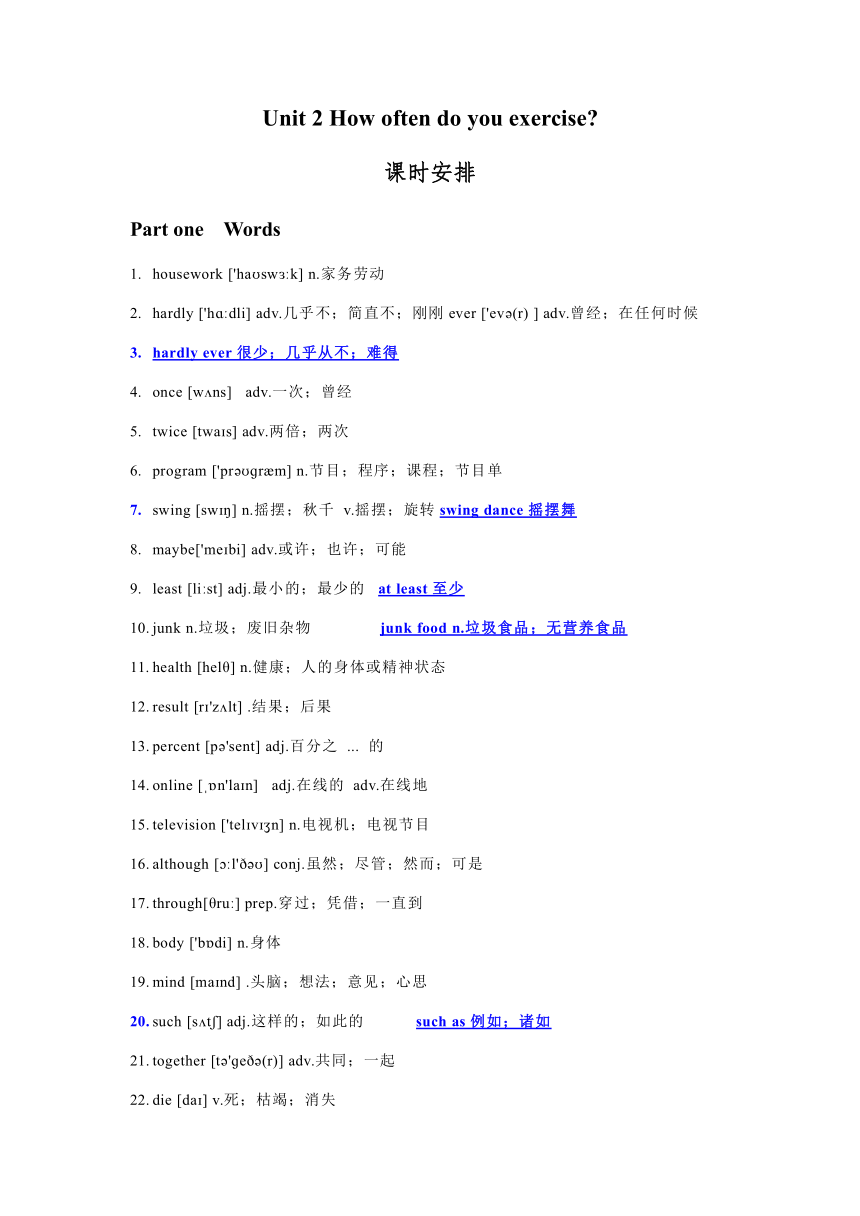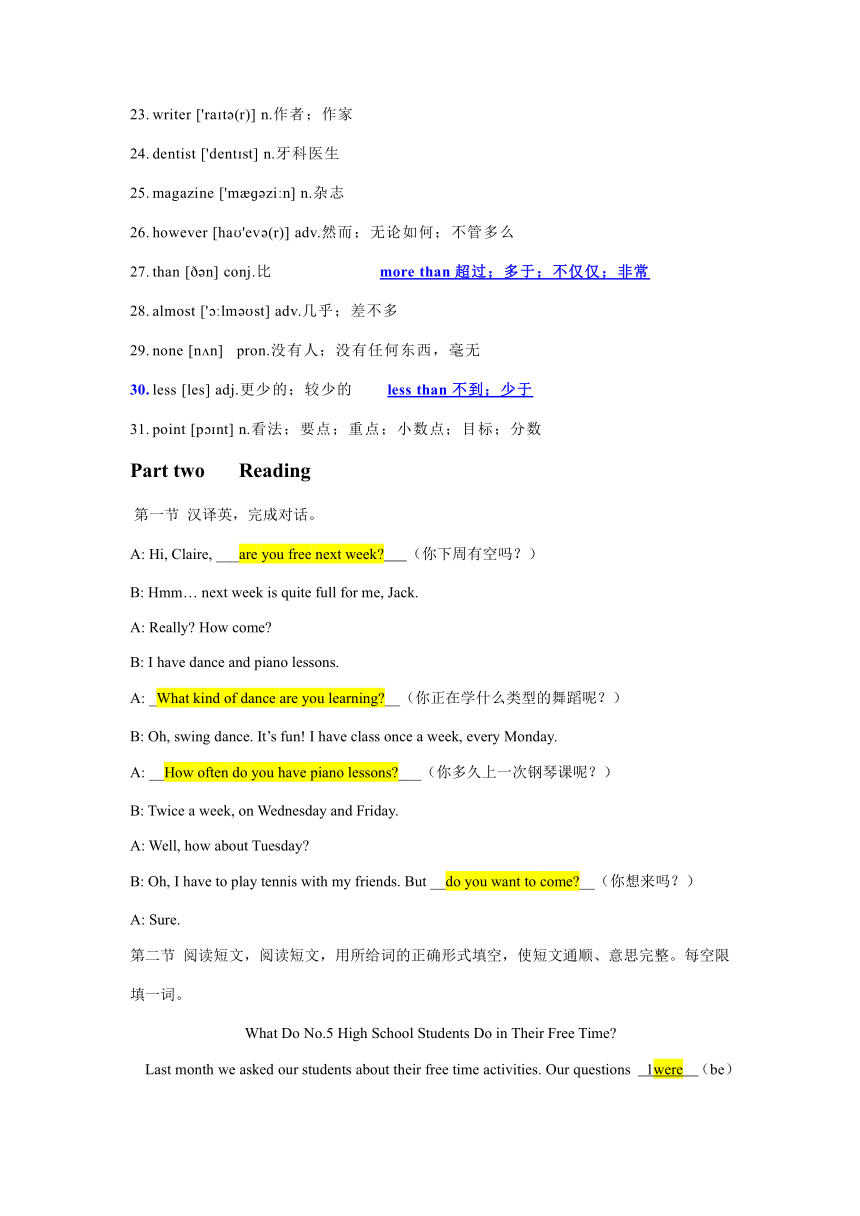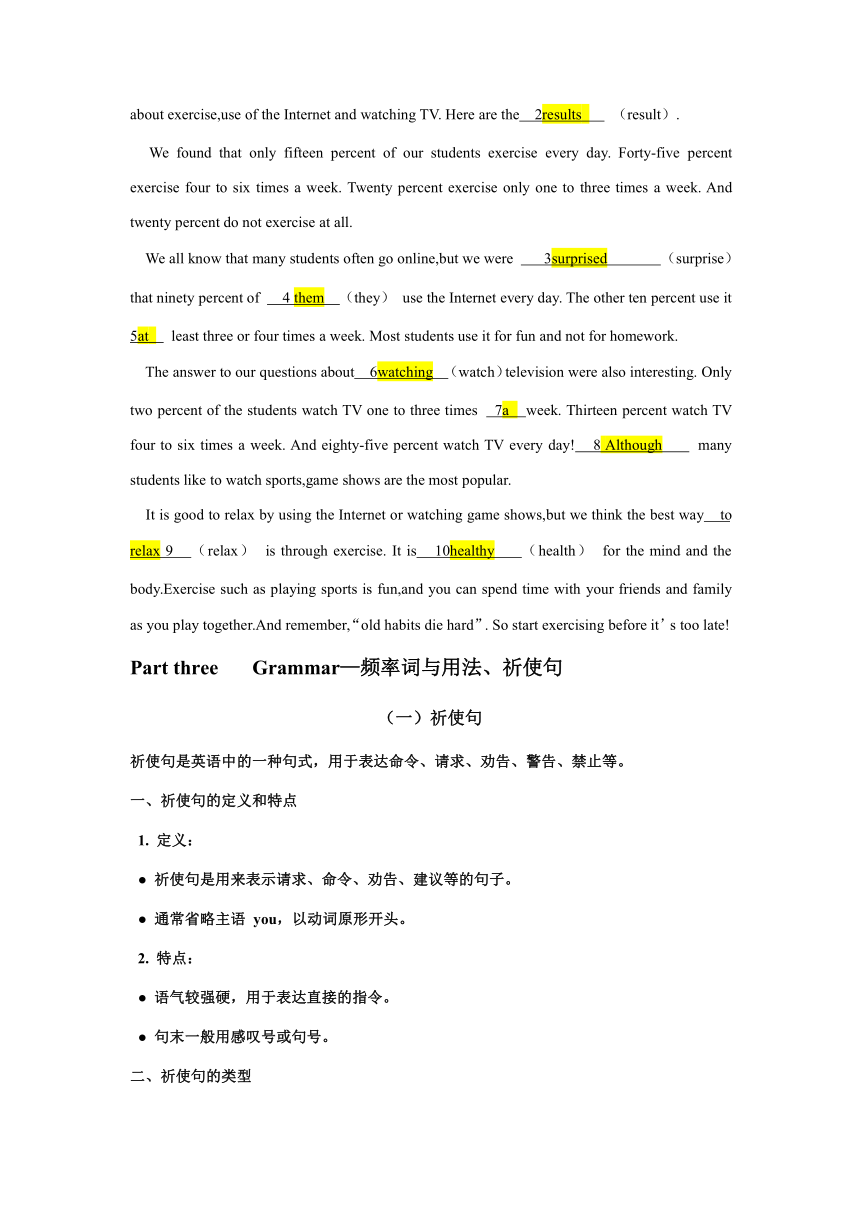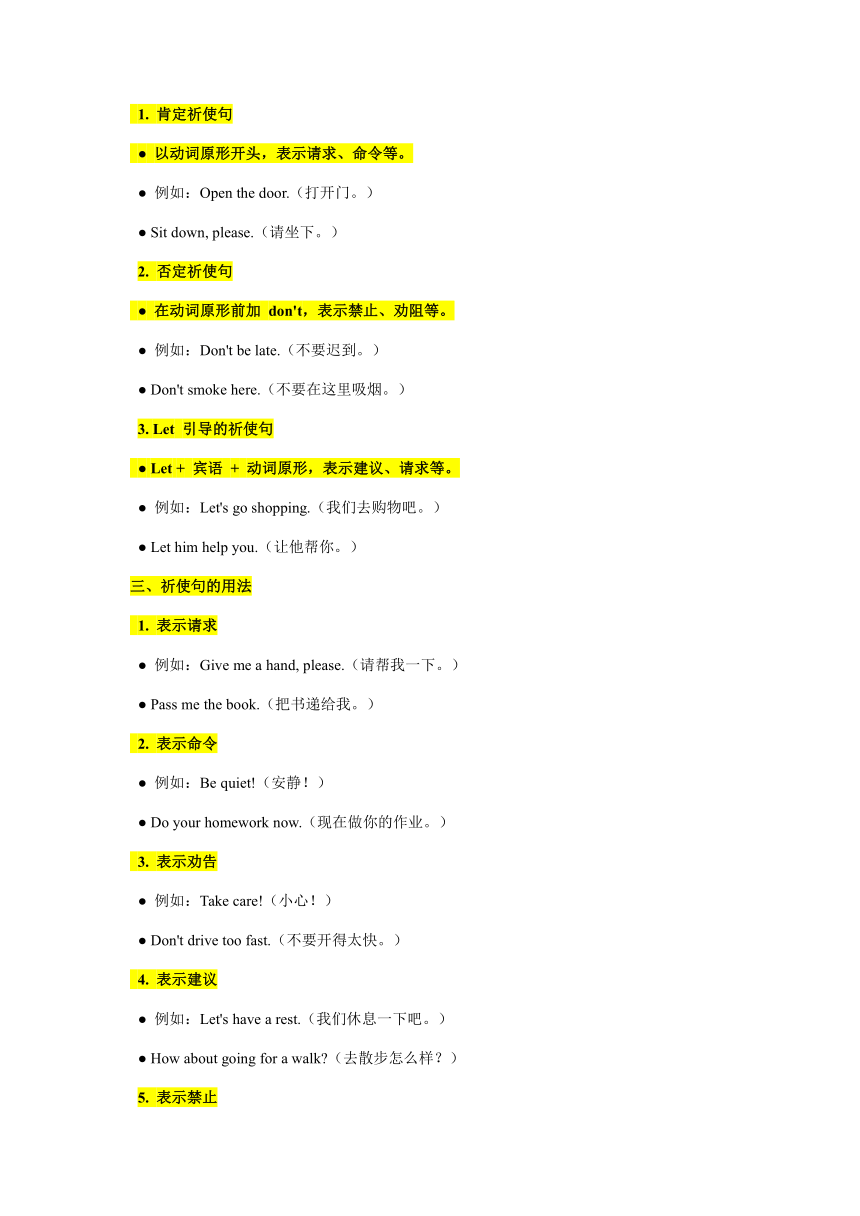人教版八年级上册Unit 2 How often do you exercise? 知识清单
文档属性
| 名称 | 人教版八年级上册Unit 2 How often do you exercise? 知识清单 |

|
|
| 格式 | docx | ||
| 文件大小 | 28.8KB | ||
| 资源类型 | 教案 | ||
| 版本资源 | 人教新目标(Go for it)版 | ||
| 科目 | 英语 | ||
| 更新时间 | 2024-09-27 00:00:00 | ||
图片预览




文档简介
Unit 2 How often do you exercise
课时安排
Part one Words
housework ['ha sw k] n.家务劳动
hardly ['hɑ dli] adv.几乎不;简直不;刚刚ever ['ev (r) ] adv.曾经;在任何时候
hardly ever很少;几乎从不;难得
once [w ns] adv.一次;曾经
twice [twa s] adv.两倍;两次
program ['pr ɡr m] n.节目;程序;课程;节目单
swing [sw ] n.摇摆;秋千 v.摇摆;旋转swing dance摇摆舞
maybe['me bi] adv.或许;也许;可能
least [li st] adj.最小的;最少的 at least至少
junk n.垃圾;废旧杂物 junk food n.垃圾食品;无营养食品
health [helθ] n.健康;人的身体或精神状态
result [r 'z lt] .结果;后果
percent [p 'sent] adj.百分之 ... 的
online [ n'la n] adj.在线的 adv.在线地
television ['tel v n] n.电视机;电视节目
although [ l' ] conj.虽然;尽管;然而;可是
through[θru ] prep.穿过;凭借;一直到
body ['b di] n.身体
mind [ma nd] .头脑;想法;意见;心思
such [s t ] adj.这样的;如此的 such as例如;诸如
together [t 'ɡe (r)] adv.共同;一起
die [da ] v.死;枯竭;消失
writer ['ra t (r)] n.作者;作家
dentist ['dent st] n.牙科医生
magazine ['m ɡ zi n] n.杂志
however [ha 'ev (r)] adv.然而;无论如何;不管多么
than [ n] conj.比 more than超过;多于;不仅仅;非常
almost [' lm st] adv.几乎;差不多
none [n n] pron.没有人;没有任何东西,毫无
less [les] adj.更少的;较少的 less than不到;少于
point [p nt] n.看法;要点;重点;小数点;目标;分数
Part two Reading
第一节 汉译英,完成对话。
A: Hi, Claire, ___are you free next week (你下周有空吗?)
B: Hmm… next week is quite full for me, Jack.
A: Really How come
B: I have dance and piano lessons.
A: _What kind of dance are you learning __(你正在学什么类型的舞蹈呢?)
B: Oh, swing dance. It’s fun! I have class once a week, every Monday.
A: __How often do you have piano lessons ___(你多久上一次钢琴课呢?)
B: Twice a week, on Wednesday and Friday.
A: Well, how about Tuesday
B: Oh, I have to play tennis with my friends. But __do you want to come __(你想来吗?)
A: Sure.
阅读短文,阅读短文,用所给词的正确形式填空,使短文通顺、意思完整。每空限填一词。
What Do No.5 High School Students Do in Their Free Time
Last month we asked our students about their free time activities. Our questions 1were (be) about exercise,use of the Internet and watching TV. Here are the 2results (result).
We found that only fifteen percent of our students exercise every day. Forty-five percent exercise four to six times a week. Twenty percent exercise only one to three times a week. And twenty percent do not exercise at all.
We all know that many students often go online,but we were 3surprised (surprise) that ninety percent of 4 them (they) use the Internet every day. The other ten percent use it 5at least three or four times a week. Most students use it for fun and not for homework.
The answer to our questions about 6watching (watch)television were also interesting. Only two percent of the students watch TV one to three times 7a week. Thirteen percent watch TV four to six times a week. And eighty-five percent watch TV every day! 8 Although many students like to watch sports,game shows are the most popular.
It is good to relax by using the Internet or watching game shows,but we think the best way to relax 9 (relax) is through exercise. It is 10healthy (health) for the mind and the body.Exercise such as playing sports is fun,and you can spend time with your friends and family as you play together.And remember,“old habits die hard”. So start exercising before it’s too late!
Part three Grammar—频率词与用法、祈使句
(一)祈使句
祈使句是英语中的一种句式,用于表达命令、请求、劝告、警告、禁止等。
一、祈使句的定义和特点
1. 定义:
● 祈使句是用来表示请求、命令、劝告、建议等的句子。
● 通常省略主语 you,以动词原形开头。
2. 特点:
● 语气较强硬,用于表达直接的指令。
● 句末一般用感叹号或句号。
二、祈使句的类型
1. 肯定祈使句
● 以动词原形开头,表示请求、命令等。
● 例如:Open the door.(打开门。)
● Sit down, please.(请坐下。)
2. 否定祈使句
● 在动词原形前加 don't,表示禁止、劝阻等。
● 例如:Don't be late.(不要迟到。)
● Don't smoke here.(不要在这里吸烟。)
3. Let 引导的祈使句
● Let + 宾语 + 动词原形,表示建议、请求等。
● 例如:Let's go shopping.(我们去购物吧。)
● Let him help you.(让他帮你。)
三、祈使句的用法
1. 表示请求
● 例如:Give me a hand, please.(请帮我一下。)
● Pass me the book.(把书递给我。)
2. 表示命令
● 例如:Be quiet!(安静!)
● Do your homework now.(现在做你的作业。)
3. 表示劝告
● 例如:Take care!(小心!)
● Don't drive too fast.(不要开得太快。)
4. 表示建议
● 例如:Let's have a rest.(我们休息一下吧。)
● How about going for a walk (去散步怎么样?)
5. 表示禁止
● 例如:Don't touch the wet paint.(不要触摸未干的油漆。)
● No smoking.(禁止吸烟。)
四、祈使句的回答
1. 肯定回答:
● Yes, I will.(好的,我会的。)
● Sure.(当然。)
● All right.(好的。)
2. 否定回答:
● No, I won't.(不,我不会。)
● Sorry, I can't.(对不起,我不能。)
五、祈使句的注意事项
1. 在祈使句中,为了使语气更加委婉,可以在句首或句末加上 please。
● 例如:Please come in.(请进。)
● Come in, please.(请进。)
2. 祈使句的否定形式一般是在动词原形前加 don't,但 let's 的否定形式是 let's not。
● 例如:Don't be late.(不要迟到。)
● Let's not go there.(我们不要去那里。)
3. 在某些情况下,可以用 No + 名词/动名词来表示禁止。
● 例如:No smoking.(禁止吸烟。)
● No parking.(禁止停车。)
4. 祈使句的反意疑问句一般用 will you 或 won't you。
● 例如:Open the door, will you (打开门,好吗?)
● Don't be late, won't you (不要迟到,好吗?)
总之,祈使句在中考英语中是一个重要的语法点,需要掌握其定义、特点、类型、用法和注意事项,以便在考试中正确运用。
祈使句用法歌诀
祈使句,祈使句,请求、命令或建议。 主语是you常省去,动词原形开头记。 否定形式要注意,句首要把Don’t加。 要讲客气用please,句首、句末没关系。
(二)频率副词
一、含义:表示次数、频率的副词被称为频度副词。常见频度副词有always (总是),usually (通常),often (经常),sometimes (有时),seldom(很少),never (从不)。对频率的提问用how often。
1.always:“总是;一直”,表示动作的重复频率最高,没有间断。
例如:He always gets up early.(他总是很早起床。)
2.usually:“通常”,表示动作的重复频率较高,有一定的规律性。
例如:I usually go to school by bike.(我通常骑自行车去上学。)
3.often:“经常”,表示动作的重复频率比较高,但不如 usually 那么有规律。
例如:She often reads books in the evening.(她晚上经常看书。)
sometimes:“有时”,表示动作的重复频率较低,偶尔发生。
sometime “在(过去或将来的)某个时候”
some times “几次/倍”
some time“一些时间”
例如:I sometimes go swimming on weekends.(我有时在周末去游泳。)
5.seldom:“很少;不常”,表示动作的重复频率很低。在句中表达否定含义。
例如:He seldom eats junk food.(他很少吃垃圾食品。)
6.never:“从不”,表示动作一次也没有发生过。在句中表达否定含义。
例如:I never smoke.(我从不吸烟。)
位置:
这些频率副词在句子中的位置一般是:放在实义动词之前,be 动词、助动词或情态动词之后。sometimes,usually位置比较灵活,可放在句首、句中或句末。
例如:He is always late for school.(他总是上学迟到。)
They often play basketball after school.(他们放学后经常打篮球。)
Sometimes/Usually she watches TV.
She sometimes/usually watches TV.
三、提问:频率副词可以用来回答由 how often 引导的特殊疑问句。
例如:—How often do you go to the library (你多久去一次图书馆?)
—I go to the library sometimes.(我有时去图书馆。)
真题感知
一、单项选择
1. —How often do you exercise —I exercise _____.
A. once a week B. in the morning C. by bike
2. My mother wants me to drink ______ milk every day because it's good for my health.
A. a lot B. a lot of C. a few
3. There are ______ students in our class who like playing basketball.
A. a number of B. the number of C. a great deal of
4. —What do you usually do on weekends —I usually ______ my homework and then watch TV.
A. do B. does C. doing
5. She is very busy, so she ______ has time to go shopping.
A. always B. usually C. hardly ever
6. Junk food is not good for our health, ______ we should eat less of it.
A. so B. but C. or
7. The doctor advised him to eat more vegetables and ______ meat.
A. less B. fewer C. little
8. —______ is your favorite sport —My favorite sport is swimming.
A. What B. How C. Why
9. He spends ______ time playing computer games and ______ time studying.
A. too much; too little B. too many; too few C. much too; little too
10. My sister is good at dancing. She ______ takes dancing lessons.
A. often B. never C. seldom
参考答案:ABAAC AAAAA
课时安排
Part one Words
housework ['ha sw k] n.家务劳动
hardly ['hɑ dli] adv.几乎不;简直不;刚刚ever ['ev (r) ] adv.曾经;在任何时候
hardly ever很少;几乎从不;难得
once [w ns] adv.一次;曾经
twice [twa s] adv.两倍;两次
program ['pr ɡr m] n.节目;程序;课程;节目单
swing [sw ] n.摇摆;秋千 v.摇摆;旋转swing dance摇摆舞
maybe['me bi] adv.或许;也许;可能
least [li st] adj.最小的;最少的 at least至少
junk n.垃圾;废旧杂物 junk food n.垃圾食品;无营养食品
health [helθ] n.健康;人的身体或精神状态
result [r 'z lt] .结果;后果
percent [p 'sent] adj.百分之 ... 的
online [ n'la n] adj.在线的 adv.在线地
television ['tel v n] n.电视机;电视节目
although [ l' ] conj.虽然;尽管;然而;可是
through[θru ] prep.穿过;凭借;一直到
body ['b di] n.身体
mind [ma nd] .头脑;想法;意见;心思
such [s t ] adj.这样的;如此的 such as例如;诸如
together [t 'ɡe (r)] adv.共同;一起
die [da ] v.死;枯竭;消失
writer ['ra t (r)] n.作者;作家
dentist ['dent st] n.牙科医生
magazine ['m ɡ zi n] n.杂志
however [ha 'ev (r)] adv.然而;无论如何;不管多么
than [ n] conj.比 more than超过;多于;不仅仅;非常
almost [' lm st] adv.几乎;差不多
none [n n] pron.没有人;没有任何东西,毫无
less [les] adj.更少的;较少的 less than不到;少于
point [p nt] n.看法;要点;重点;小数点;目标;分数
Part two Reading
第一节 汉译英,完成对话。
A: Hi, Claire, ___are you free next week (你下周有空吗?)
B: Hmm… next week is quite full for me, Jack.
A: Really How come
B: I have dance and piano lessons.
A: _What kind of dance are you learning __(你正在学什么类型的舞蹈呢?)
B: Oh, swing dance. It’s fun! I have class once a week, every Monday.
A: __How often do you have piano lessons ___(你多久上一次钢琴课呢?)
B: Twice a week, on Wednesday and Friday.
A: Well, how about Tuesday
B: Oh, I have to play tennis with my friends. But __do you want to come __(你想来吗?)
A: Sure.
阅读短文,阅读短文,用所给词的正确形式填空,使短文通顺、意思完整。每空限填一词。
What Do No.5 High School Students Do in Their Free Time
Last month we asked our students about their free time activities. Our questions 1were (be) about exercise,use of the Internet and watching TV. Here are the 2results (result).
We found that only fifteen percent of our students exercise every day. Forty-five percent exercise four to six times a week. Twenty percent exercise only one to three times a week. And twenty percent do not exercise at all.
We all know that many students often go online,but we were 3surprised (surprise) that ninety percent of 4 them (they) use the Internet every day. The other ten percent use it 5at least three or four times a week. Most students use it for fun and not for homework.
The answer to our questions about 6watching (watch)television were also interesting. Only two percent of the students watch TV one to three times 7a week. Thirteen percent watch TV four to six times a week. And eighty-five percent watch TV every day! 8 Although many students like to watch sports,game shows are the most popular.
It is good to relax by using the Internet or watching game shows,but we think the best way to relax 9 (relax) is through exercise. It is 10healthy (health) for the mind and the body.Exercise such as playing sports is fun,and you can spend time with your friends and family as you play together.And remember,“old habits die hard”. So start exercising before it’s too late!
Part three Grammar—频率词与用法、祈使句
(一)祈使句
祈使句是英语中的一种句式,用于表达命令、请求、劝告、警告、禁止等。
一、祈使句的定义和特点
1. 定义:
● 祈使句是用来表示请求、命令、劝告、建议等的句子。
● 通常省略主语 you,以动词原形开头。
2. 特点:
● 语气较强硬,用于表达直接的指令。
● 句末一般用感叹号或句号。
二、祈使句的类型
1. 肯定祈使句
● 以动词原形开头,表示请求、命令等。
● 例如:Open the door.(打开门。)
● Sit down, please.(请坐下。)
2. 否定祈使句
● 在动词原形前加 don't,表示禁止、劝阻等。
● 例如:Don't be late.(不要迟到。)
● Don't smoke here.(不要在这里吸烟。)
3. Let 引导的祈使句
● Let + 宾语 + 动词原形,表示建议、请求等。
● 例如:Let's go shopping.(我们去购物吧。)
● Let him help you.(让他帮你。)
三、祈使句的用法
1. 表示请求
● 例如:Give me a hand, please.(请帮我一下。)
● Pass me the book.(把书递给我。)
2. 表示命令
● 例如:Be quiet!(安静!)
● Do your homework now.(现在做你的作业。)
3. 表示劝告
● 例如:Take care!(小心!)
● Don't drive too fast.(不要开得太快。)
4. 表示建议
● 例如:Let's have a rest.(我们休息一下吧。)
● How about going for a walk (去散步怎么样?)
5. 表示禁止
● 例如:Don't touch the wet paint.(不要触摸未干的油漆。)
● No smoking.(禁止吸烟。)
四、祈使句的回答
1. 肯定回答:
● Yes, I will.(好的,我会的。)
● Sure.(当然。)
● All right.(好的。)
2. 否定回答:
● No, I won't.(不,我不会。)
● Sorry, I can't.(对不起,我不能。)
五、祈使句的注意事项
1. 在祈使句中,为了使语气更加委婉,可以在句首或句末加上 please。
● 例如:Please come in.(请进。)
● Come in, please.(请进。)
2. 祈使句的否定形式一般是在动词原形前加 don't,但 let's 的否定形式是 let's not。
● 例如:Don't be late.(不要迟到。)
● Let's not go there.(我们不要去那里。)
3. 在某些情况下,可以用 No + 名词/动名词来表示禁止。
● 例如:No smoking.(禁止吸烟。)
● No parking.(禁止停车。)
4. 祈使句的反意疑问句一般用 will you 或 won't you。
● 例如:Open the door, will you (打开门,好吗?)
● Don't be late, won't you (不要迟到,好吗?)
总之,祈使句在中考英语中是一个重要的语法点,需要掌握其定义、特点、类型、用法和注意事项,以便在考试中正确运用。
祈使句用法歌诀
祈使句,祈使句,请求、命令或建议。 主语是you常省去,动词原形开头记。 否定形式要注意,句首要把Don’t加。 要讲客气用please,句首、句末没关系。
(二)频率副词
一、含义:表示次数、频率的副词被称为频度副词。常见频度副词有always (总是),usually (通常),often (经常),sometimes (有时),seldom(很少),never (从不)。对频率的提问用how often。
1.always:“总是;一直”,表示动作的重复频率最高,没有间断。
例如:He always gets up early.(他总是很早起床。)
2.usually:“通常”,表示动作的重复频率较高,有一定的规律性。
例如:I usually go to school by bike.(我通常骑自行车去上学。)
3.often:“经常”,表示动作的重复频率比较高,但不如 usually 那么有规律。
例如:She often reads books in the evening.(她晚上经常看书。)
sometimes:“有时”,表示动作的重复频率较低,偶尔发生。
sometime “在(过去或将来的)某个时候”
some times “几次/倍”
some time“一些时间”
例如:I sometimes go swimming on weekends.(我有时在周末去游泳。)
5.seldom:“很少;不常”,表示动作的重复频率很低。在句中表达否定含义。
例如:He seldom eats junk food.(他很少吃垃圾食品。)
6.never:“从不”,表示动作一次也没有发生过。在句中表达否定含义。
例如:I never smoke.(我从不吸烟。)
位置:
这些频率副词在句子中的位置一般是:放在实义动词之前,be 动词、助动词或情态动词之后。sometimes,usually位置比较灵活,可放在句首、句中或句末。
例如:He is always late for school.(他总是上学迟到。)
They often play basketball after school.(他们放学后经常打篮球。)
Sometimes/Usually she watches TV.
She sometimes/usually watches TV.
三、提问:频率副词可以用来回答由 how often 引导的特殊疑问句。
例如:—How often do you go to the library (你多久去一次图书馆?)
—I go to the library sometimes.(我有时去图书馆。)
真题感知
一、单项选择
1. —How often do you exercise —I exercise _____.
A. once a week B. in the morning C. by bike
2. My mother wants me to drink ______ milk every day because it's good for my health.
A. a lot B. a lot of C. a few
3. There are ______ students in our class who like playing basketball.
A. a number of B. the number of C. a great deal of
4. —What do you usually do on weekends —I usually ______ my homework and then watch TV.
A. do B. does C. doing
5. She is very busy, so she ______ has time to go shopping.
A. always B. usually C. hardly ever
6. Junk food is not good for our health, ______ we should eat less of it.
A. so B. but C. or
7. The doctor advised him to eat more vegetables and ______ meat.
A. less B. fewer C. little
8. —______ is your favorite sport —My favorite sport is swimming.
A. What B. How C. Why
9. He spends ______ time playing computer games and ______ time studying.
A. too much; too little B. too many; too few C. much too; little too
10. My sister is good at dancing. She ______ takes dancing lessons.
A. often B. never C. seldom
参考答案:ABAAC AAAAA
同课章节目录
- Unit 1 Where did you go on vacation?
- Section A
- Section B
- Unit 2 How often do you exercise?
- Section A
- Section B
- Unit 3 I'm more outgoing than my sister.
- Section A
- Section B
- Unit 4 What's the best movie theater?
- Section A
- Section B
- Unit 5 Do you want to watch a game show?
- Section A
- Section B
- Unit 6 I'm going to study computer science.
- Section A
- Section B
- Unit 7 Will people have robots?
- Section A
- Section B
- Unit 8 How do you make a banana milk shake?
- Section A
- Section B
- Unit 9 Can you come to my party?
- Section A
- Section B
- Unit 10 If you go to the party, you'll have a grea
- Section A
- Section B
